The World Economic Forum today announced the theme and details for its 50th Annual Meeting, to be held 21-24 January in Davos, Switzerland. The Meeting’s theme will be Stakeholders for a Cohesive and Sustainable World. It will bring together 3,000 participants from around the world, and aim to give concrete meaning to “stakeholder capitalism”, assist governments and international institutions in tracking progress towards the Paris Agreement and the Sustainable Development Goals, and facilitate discussions on technology and trade governance.

“People are revolting against the economic ‘elites’ they believe have betrayed them, and our efforts to keep global warming limited to 1.5°C are falling dangerously short,” said Professor Klaus Schwab, Founder and Executive Chairman at the World Economic Forum. “With the world at such critical crossroads, this year we must develop a ‘Davos Manifesto 2020’ to reimagine the purpose and scorecards for companies and governments. It is what the World Economic Forum was founded for 50 years ago, and it is what we want to contribute to for the next 50 years.”
The Programme for the Annual Meeting will prioritize six key areas:
- Ecology: How to mobilize business to respond to the risks of climate change and ensure that measures to protect biodiversity reach forest floors and ocean beds.
- Economy: How to remove the long-term debt burden and keep the economy working at a pace that allows higher inclusion.
- Technology: How to create a global consensus on deployment of Fourth Industrial Revolution technologies and avoid a ‘technology war’.
- Society: How to reskill and upskill a billion people in the next decade.
- Geopolitics: How the ‘spirit of Davos’ can create bridges to resolve conflicts in global hotspots. Informal meetings to set kickstart conciliation.
- Industry: How to help business create the models necessary to drive enterprise in the Fourth Industrial Revolution. How to navigate an enterprise in a world exposed to political tensions and driven by exponential technological change as well as increasing expectations from all stakeholders.
The World Economic Forum and stakeholder capitalism
The Forum’s first meeting in 1971 was established to further the idea put forward by Professor Klaus Schwab that business should serve all stakeholders – customers, employees, communities, as well as shareholders. It was reaffirmed in 1973 in the “Davos Manifesto,” a document that has shaped the work of the Forum ever since. In a major update, this year’s Annual Meeting will see the publication of a universal “ESG scorecard” by the Forum’s International Business Council, which is currently chaired by Brian Moynihan, Chief Executive Officer of Bank of America.
A more sustainable Annual Meeting
The 2020 Annual Meeting will be among the most sustainable international summits ever held. Awarded the IS0 20121 standard for sustainable events in 2018, the Annual Meeting is fully carbon neutral through reducing, calculating and offsetting event-related emissions. Initiatives put in place to achieve this goal include using locally-sourced food suppliers, introducing alternative sources of protein to reduce meat consumption, sourcing 100% renewable electricity, and reducing or eliminating the use of materials that cannot easily be recycled or re-used, such as carpets and introducing more electric vehicles.












